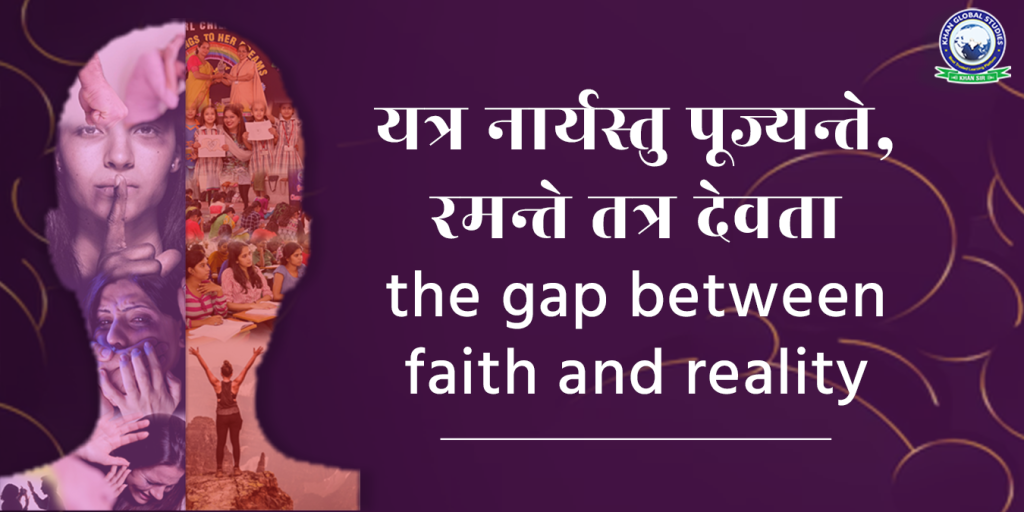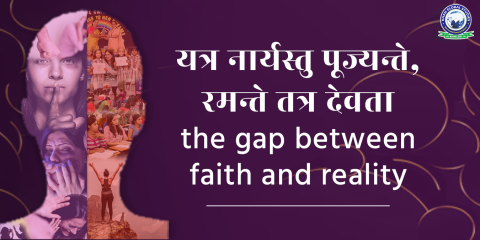“यत्र नार्यस्तु पूज्यन्ते, रमन्ते तत्र देवता”.
The ancient Sanskrit proverb, “Yatra Naryastu Pujyante, Ramante Tatra Devataa,” translates to “Where women are worshipped, gods reside.” This proverb emphasizes the high regard for women in India’s spiritual and philosophical traditions. It not only symbolizes respect, but also an understanding of the important role women play in maintaining the balance of family, society, and culture.
However, the harsh reality of today’s world is opposite to this idea. Women often do not get the respect and opportunities that their male counterparts earn. They face deep discrimination and violence, which shatters the ideal expressed in this ancient verse. The gap between faith in theory and reality on the ground is huge, and the struggles faced by women are evidence of the challenges of bridging this divide.
Status of Women in Modern Society
In many parts of the world, especially in traditionally patriarchal societies, women are relegated to subordinate roles. They are seen as caregivers, homemakers and nurturers, but rarely as decision-makers or equals. The social fabric is entangled in outdated stereotypes that undermine women’s values and contributions.
Violence against women, both physical and emotional, is a widespread phenomenon. Women face crimes such as gender-based violence, domestic abuse, sexual harassment and worse – female foeticide, which continues in parts of India. Despite educational progress and economic opportunities, these prejudices are deeply ingrained, which continue to limit women’s potential and freedom.
The Paradox of Haryana: Prosperity versus Gender Inequality
A striking example is Haryana, which stands as a paradox in terms of development. While Haryana has shown substantial economic growth, it has one of the lowest sex ratios in India. This imbalance raises questions about the underlying social norms and cultural practices that still determine the value of women’s lives.
Why is it that a state with a rapidly growing economy still struggles with fundamental gender equality? The answer lies in the complex web of tradition, social conditioning and patriarchal power structures. In Haryana, especially in rural areas, women often find their movements restricted, their voices suppressed and their choices determined by social norms that emphasise male superiority.
In rural Haryana, there is a stark contrast between the daily lives of men and women. Women are often confined to the domestic sphere, draped in veils, while men dominate public spaces such as the chaupal and panchayat, where village decisions are taken.
Cultural Reflections of Male Dominance
The cultural mindset in Haryana is reinforced through local proverbs, such as “Jaat kahe jaatni ne, je gaon mein sukhi rehna; keedi khagi haathi ne, haanji haanji kehna,” which means, “If a man tells a woman that if she wants to live happily in the village, she must agree with him – even if he says that an ant ate the elephant.” Such proverbs reflect the dominant role of men and the subordinate role expected of women, regardless of logic or fairness.
The exclusion of women from decision-making spaces such as baithaks (gatherings) and chaupals further reinforces this imbalance. In many cases, women do not even know how to proceed in these male-dominated spaces, symbolizing their alienation from the systems that govern their lives.
Motherhood and Sacrifice: A Global Phenomenon
The theme of women as caregivers transcends geographical boundaries. Mothers around the world are often seen sacrificing their own needs for the sake of their families. Many believe that selflessness is inherent in women, especially when they take on the role of a mother. This is not just limited to humans but is also seen in nature. Stegodyphus dumicola, a spider species from South Africa, exemplifies this self-sacrifice – the mother spider lays eggs to nourish her babies and eventually allows them to eat her own body to survive.
However, the glorification of such sacrifices often hides the systemic injustices women face. In countless households, mothers like the one in the previous story serve their families first, often sacrificing their own needs and desires. This selflessness, while admirable, is also the result of social conditioning that places women in subordinate roles, always prioritizing others over themselves.
The Roots of Hate: Why Violence Against Women Persists
At the core of gender-based violence is the deeply held belief that men are superior to women. Cultural practices, social structures, and legal systems often reflect and reinforce this ideology. Whether it is female foeticide, domestic abuse or institutionalised gender discrimination, hatred towards women manifests in various forms that cross cultures and borders.
This hatred is rooted in patriarchal power – a system that thrives by subordinating women. The suppression of women’s rights, mobility and freedom has long-term implications for the entire society. Women, who play an integral role in the socio-economic development of families and communities, are systematically denied the opportunity to realise their full potential.
Creating Equal Spaces for All
To ensure a just and sustainable future, societies must challenge and dismantle the structures that perpetuate gender-based violence and discrimination. This means addressing legal frameworks that fail to protect women and changing cultural and social norms that allow this inequality to continue.
Empowering women, providing them with equal opportunities and respecting their autonomy can transform not just individual lives but entire communities.
By fostering an environment of equality we can ensure that both men and women prosper. This is not just a social or moral imperative; it is vital to the survival and progress of humanity.




